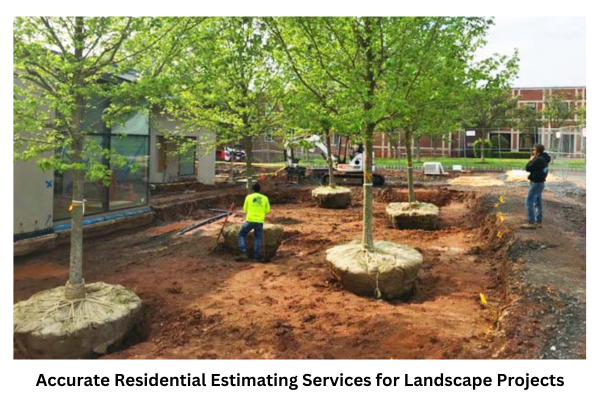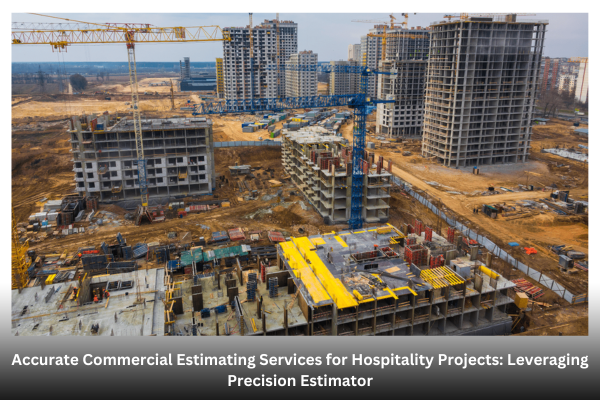In the dynamic world of commercial construction, retail construction projects demand a unique set of skills, knowledge, and precision. From large-scale shopping malls to standalone retail stores, commercial retail spaces need to be carefully planned, designed, and executed to meet both the functional needs of businesses and the aesthetic expectations of consumers. For precision estimators, providing expert commercial estimating services for retail construction is crucial to ensuring the project stays within budget, on schedule, and in line with regulatory requirements.
Why Expert Commercial Estimating is Essential for Retail Construction
Retail construction projects are diverse, ranging from small retail stores and boutique shops to expansive shopping centers and malls. Each project has its unique needs, timelines, and budget constraints. Whether you’re building a new retail space from the ground up or renovating an existing building to accommodate a new store, accurate commercial estimating is vital to ensure the project is completed efficiently and cost-effectively.
Commercial estimating services for retail construction involve the detailed calculation of costs related to all aspects of the build, including labor, materials, equipment, and subcontractor fees. Accurate estimates help to:
- Ensure Budget Adherence
Retail construction projects often have tight budgets. An inaccurate estimate can lead to overspending, delays, or project compromises. Expert estimating ensures that all aspects of the build are accounted for, providing accurate cost projections from start to finish. - Support Design and Planning Decisions
Retail construction involves a combination of functionality, aesthetics, and efficiency. From store layouts and signage to lighting and HVAC systems, estimating services help project owners and contractors determine what’s feasible within the specified budget. Precision estimators help architects and designers understand the cost implications of different design choices early in the process, allowing for better planning and decision-making. - Improve Project Efficiency
With expert estimating, construction teams can plan and execute tasks more efficiently. Accurate estimates lead to better material procurement, labor scheduling, and task sequencing. This reduces delays, ensures a smooth workflow, and ultimately accelerates the project’s timeline. - Mitigate Risk
Cost overruns, unexpected material shortages, and labor inefficiencies are common challenges in construction projects. Accurate estimating helps mitigate these risks by identifying potential issues before they become problems. Expert estimators factor in contingencies for unforeseen circumstances, providing a more reliable safety net for the project. - Comply with Codes and Regulations
Retail construction must adhere to various building codes, safety standards, and zoning laws. Expert estimators ensure that the MEP (Mechanical, Electrical, Plumbing) systems, fire protection, accessibility, and other regulatory requirements are incorporated into the estimate, helping avoid costly rework and compliance issues.
Key Elements of Expert Commercial Estimating for Retail Construction
Commercial estimating services for retail construction cover a wide range of elements, each of which plays a significant role in determining the final cost of the project. The following are key elements of expert commercial estimating:
1. Detailed Takeoffs
A detailed takeoff is the first step in estimating the costs of a retail construction project. Takeoffs involve a careful measurement of quantities from architectural and engineering drawings, including:
- Materials: The type and amount of materials required, such as steel, concrete, flooring, roofing, drywall, and finishes.
- Labor: Estimating the man-hours needed for each phase of construction.
- Equipment: Heavy machinery and specialized tools needed to carry out the work.
- Subcontractor Costs: Pricing for specialized work such as electrical, plumbing, HVAC, and fire protection.
A precise takeoff helps estimators identify all the materials and labor needed to complete the project, forming the foundation for an accurate cost estimate.
2. Material Sourcing and Cost Analysis
Once the quantities are determined through takeoffs, the next step is sourcing materials and calculating their costs. Estimators must consider:
- Material Availability: The availability of specific materials, particularly in times of supply chain disruption, can affect pricing and timelines.
- Supplier Quotes: Estimators gather quotes from suppliers and manufacturers to determine accurate prices for materials, factoring in delivery times and costs.
- Alternative Materials: In some cases, estimators may recommend alternative materials that provide cost savings without compromising quality or performance.
Retail construction projects often involve specialized finishes, such as flooring, lighting, or custom features. Estimators must consider these unique needs while ensuring the project remains within budget.
3. Labor Cost Estimation
Labor costs represent a significant portion of any retail construction project. Expert estimators calculate labor costs based on:
- Trade Categories: The different construction trades required, such as carpentry, electrical work, plumbing, drywall installation, and finishing.
- Labor Rates: Regional wage rates for each trade, including union or non-union labor.
- Crew Sizes and Productivity: Determining the appropriate number of workers for each phase of the project and estimating how long the tasks will take based on historical data and productivity rates.
Labor costs can vary widely depending on the complexity of the work and the region, so precise calculations are crucial.
4. Project Schedule and Phasing
A crucial component of commercial estimating services is the development of an accurate project schedule. Estimators help contractors and project managers determine the most efficient timeline for the project, factoring in:
- Construction Phases: Breaking the project down into key phases, such as site preparation, foundation work, structural framing, and finishing.
- Lead Times for Materials: Estimating the time it will take to procure materials, including any potential delays in shipping or manufacturing.
- Labor Scheduling: Coordinating labor forces to ensure that tasks are completed on time and that workers are available as needed.
By creating a realistic schedule with clear milestones, estimators help contractors avoid bottlenecks and keep the project on track.
5. MEP Systems Estimating
In retail construction, MEP systems (Mechanical, Electrical, and Plumbing) are essential components of the project. Estimating MEP systems involves:
- HVAC Systems: The design and installation of heating, ventilation, and air conditioning systems to ensure comfort for customers and employees.
- Electrical Systems: Power supply, lighting, and communication systems that support the operation of the retail space.
- Plumbing: Water supply, drainage, and sanitary systems that must be accurately estimated to avoid system failures or costly rework.
Estimates for MEP systems often require close collaboration with specialists and subcontractors to ensure the design and installation meet regulatory codes and customer needs.
6. Contingency Planning
In any construction project, there are always uncertainties and risks. Expert estimators include a contingency allowance in their estimates to account for:
- Unforeseen Issues: Hidden structural problems, changes in design, or unexpected site conditions that may arise during construction.
- Material Price Fluctuations: Variations in material prices due to market conditions, labor shortages, or supply chain disruptions.
- Design Changes: Any last-minute changes requested by the client or adjustments made by architects and engineers.
Contingencies help ensure that the project remains financially stable and that the contractor is not blindsided by unforeseen costs.
Challenges in Retail Construction Estimating
Retail construction comes with unique challenges that precision estimators must address:
- Complex Designs and Custom Features: Many retail spaces require specialized designs, including custom finishes, unique lighting, and branding elements that can complicate the estimating process.
- Tight Deadlines: Retail projects, especially those in high-demand locations, often have tight deadlines, meaning estimators must balance speed with accuracy.
- Regulatory Requirements: Retail spaces must adhere to a variety of local codes, accessibility standards, and environmental regulations, which adds complexity to the estimating process.
How Precision Estimators Deliver Value
Precision estimators provide value by offering accurate, timely estimates that help retail construction projects stay within budget, meet deadlines, and adhere to design specifications. Through their expertise in material sourcing, labor management, and MEP systems, they ensure that every detail is accounted for, providing project owners and contractors with the confidence to move forward with their plans.
Conclusion
Expert commercial estimating services for retail construction are essential to the successful completion of any retail project, whether it’s a small boutique or a large shopping mall. With the right precision estimating services, contractors can effectively manage costs, avoid delays, and ensure the building meets all functional and aesthetic requirements. By leveraging detailed takeoffs, cost analysis, labor planning, and scheduling expertise, precision estimators help retail construction projects stay on track, within budget, and on time. For project owners and contractors looking to execute high-quality retail spaces, partnering with an expert estimator is an investment in project success.


